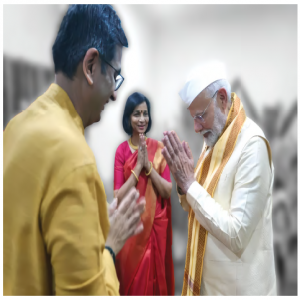
 Fr. Gaurav Nair
Fr. Gaurav Nair

The viral images of Prime Minister Narendra Modi and Chief Justice of India (CJI) DY Chandrachud side by side at a puja on Ganesh Chaturthi have sent shockwaves through the legal fraternity and citizens. While this may have appeared to be a personal event, the implications go far beyond. The executive and the judiciary playing bedfellows strikes at the heart of constitutional values—particularly the principle of the separation of powers.
The judiciary serves as an impartial arbiter, upholding the Constitution and checking the executive and legislative powers. The principle of separation of powers is enshrined in the Constitution. Article 50 mandates the State to separate the judiciary from the executive. This is the bedrock of public faith in the judiciary's independence and ability to deliver justice impartially.
When judges are seen in close personal interaction with political leaders, it sends a dangerous signal. Such interactions birth suspicions about the impartiality of past, present and future judgments. It is not without substance that Sanjay Raut of Shiv Sena (UBT) has called for the CJI to back off from making a judgement in Maharashtra. In a country where trust in institutions is already fragile, actions compromising the perception of independence have a lasting impact.
It is no secret that post-retirement positions for judges have always been contentious. Several retired judges have been appointed to commissions, tribunals, or political positions. It is concerning as judges might tailor their decisions to secure favourable engagements. This meeting, just two months before the CJI's retirement, has led to widespread speculation.
This incident cannot be viewed in isolation. There has been a growing concern over the judiciary's inaction in sanctioning the BJP's polarising actions. The judiciary has often failed to hold the government accountable on key issues, from electoral bonds to hate speech. Instead of taking a firm stance, the judiciary has allowed these matters to fester, leaving a vacuum filled by the ruling party with its own narrative.
This is further compounded by its failure to bring justice in cases involving right-wing violence. CJI Chandrachud was part of the bench that presided over the Ayodhya verdict, which ultimately handed over the disputed land to the Hindus. The judgment visibly sidestepped justice for the victims. The perpetrators, part of the Sangh Parivar, walked free. The decision was met with widespread dismay among those who expected the judiciary to deliver justice in one of India's most divisive conflicts.
Some argue that such interactions between the judiciary and the executive have historical precedents. However, these past transgressions cannot serve as a justification for continuing such practices. In fact, these instances should serve as warnings of the dangers posed when the judiciary allows itself to be drawn into the orbit of the executive. In a time of heightened political tension, religious polarisation, and increasing attacks on minorities, the judiciary's independence is more crucial than ever.
The public's disappointment is palpable. Many had hoped the CJI would stand as a beacon of judicial independence. This event has cast a long shadow over his legacy. It is a reminder that public trust in the judiciary can be undermined instantly by actions that suggest undue proximity to the executive.